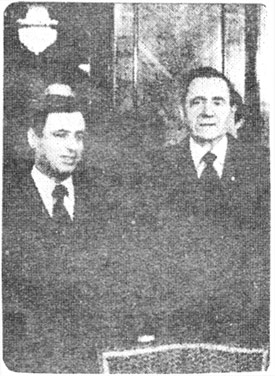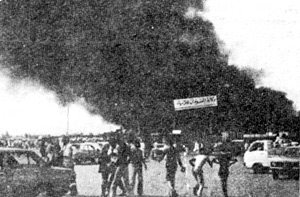
WAR AND PEACE IN THE MIDDLE EAST
Following U.S. Israeli Moves on Golan:
SYRIA AND U.S.S.R. REINFORCE COOPERATION, DECLARE NECESSITY FOR COMPLETE ISRAELI WITHDRAWAL
During a visit of Syrian Foreign Minister Abdul Halim Khaddam to the Soviet Union on January 14 and 15, both sides confirmed their will to reinforce cooperation between their countries in all fields on the basis of the friendship treaty signed between the Soviet Union and Syria in 1980. At the end of the two-day talks between Khaddam and Soviet Foreign Minister Andrei Gromyko, a joint communique was issued strongly condemning Israel's recent annexation of the Golan backed by the United States of America, denouncing the aggressive Camp David policies and reaffirming that any just peace in the Middle East must be based on a complete Israeli withdrawal from the occupied Arab territories and a full recognition of the Palestinian people's national rights. Following are the main excerpts of the Soviet-Syrian joint communique:

Khaddam meets Gromyko in Moscow.
Discussions between Mr. Abdul Halim Khaddam and Mr. Andrei Gromyko "centred on the grave situation in the Middle East, resulting from the Israeli decision to annex the Golan Heights. This Israeli measure constitutes a flagrant violation of the UN Charter and resolutions, and a dangerous threat to peace and security in the area and the world at large. The two sides were of the opinion that there is need to confront the recent serious developments in this area.
"They also reviewed matters relating to the situation in the Middle East and the Israeli aggression against the Arab countries. They condemned the Israeli-American schemes in the area, which aim at strengthening the American presence in the Middle East region and at encouraging Israeli expansion at the expense of the Arab nation as a whole and the Palestinian people in particular.
"They agreed that the 'strategic cooperation' agreement concluded between the U.S. and Israel represented a serious event with effects going beyond the Middle East conflict.
"They also stressed their refusal of 'separate deals' and condemned the Camp David accords, the Israeli-Egyptian treaty and the autonomy conspiracy.
"They stressed that a just peace must be based on a complete Israeli withdrawal from the Arab territories occupied in 1967 and on full recognition of the national rights of the Palestinian Arab people, including their right to self-determination and to establishing their independent state.
"The two sides discussed the American-imperialist attempts to aggravate the situation through their interference in the internal affairs of other countries. The two sides also condemned the attempts at interfering in the internal affairs of the People's Democratic Republic of Poland by the U.S. and its NATO allies in violation of provisions of the UN Charter and international law."
During a reception in honour of the Syrian guest, Soviet Foreign Minister Gromyko sharply criticized U.S. policy in the Middle East, which he called a "ferment for the expansionist greeds of Israel". Commenting on the annexation of the Golan, he said: "It is obvious that Israel would not have such a provocative attitude if it had not felt supported and spurred on by Washington. "It was the 'strategic cooperation' understanding between Washington and Tel Aviv, which "has pushed Israel into annexing the Golan." Gromyko also denounced the setting up of the multinational force - "in fact and American one" - in Sinai. He concluded by stating that "the Arabs will never be resigned to the occupation of their lands and never renounce their right to freedom and independence" and by reaffirming the support of the Soviet Union for the struggle of the Arab peoples.
On his return from the U.S.S.R., the Syrian Foreign Minister on January 17 described the results of his visit as "fruitful and constructive for the development of Syrian-Soviet relations."
SAUDI MOVE TO REESTABLISH ARAB SOLIDARITY

Speaking to students at the Dhahran Petroleum University on January 1, Prince Fahd said that Saudi Arabia was not hostile to the socialist camp and could have friendly relations with them.
He also declared that the reestablishment of diplomatic relations with Libya would be "the first step to eliminate Arab differences and create a healthier political climate in order to succeed at the next Arab Summit which is the principal framework for any joint Arab action."
NEW LINKS IN THE CHAIN OF TERROR
The U.S. has embarked on the construction of a new launchpad for aggression in the Gulf region. Transport aircraft and advanced electronic spy systems will be based on Oman's Masira Island and is expected to cost $100 million. This air base joins two others in Dhofar and near Muscat and forms a new link in a chain of terror which encircles the Indian Ocean and thrusts right into the heart of the Middle East.
Oman participated late last year in the largest U.S. wargames ever staged in the Middle East - operation "Bright Star 81", designed to test the capability of the U.S. Rapid Deployment Force. The New York Times reported that six container ships to be converted into troop carriers for the RDF have been bought by the Pentagon for $208 million. They are part of a 20-vessel fleet capable of transporting a 30,000-man invasion force and equipment to the Middle East and Gulf Region.
Meanwhile, in Sri Lanka on January 17, a mass rally took place in opposition to plans for a U.S. base at Lanka Trincomalee port. Sirimavo Bandaranaike of the Freedom Party called on all political forces in the country to form a single front to oppose U.S. military presence on Sri Lanka. This would be a threat to the security of not only Sri Lanka, but to all countries surrounding the Indian Ocean.
DE CUELLAR: CAMP DAVID OBSTRUCTS PEACE IN MIDEAST
In a press interview with the daily New York Times, the U.N. Secretary-General Mr. De Cuellar confirmed that the establishment of a Palestinian state is an important question to achieve durable peace in the Middle East. Voice of America Radio quoted Mr. De Cuellar as saying that the setting up of a Palestinian state is a legitimate demand. De Cuellar added that the Egyptian-Israeli agreement obstructs the search for a lasting peace in the Middle East.
DANGER MOUNTS IN CHAD
The Chadian people have suffered for decades under the weight of French imperialism. After the colonial period, France and the U.S. never ceased their indirect interference in Chad, dividing the population and creating internal instability. In November 1981, under French and U.S. pressure, Chad asked the Libyan defence forces to pull out from the country.
The withdrawal of Libyan troops from Chad has created a vacuum from which the forces of imperialism have hastened to profit. Chadian rebels led by Hussein Habre immediately renewed military operations in the east of the country and are now poised to take N'djamena, the capital city. America's Central Intelligence Agency (CIA), and Israeli, Egyptian and Sudanese advisers are training the rebel groups in bases in Sudan. Certain quarters in France also supply substantial aid to the puppet anti-Chad grouping.
At the instigation of France, backed by the United States, a six-nation African Peace-Keeping Force was set up (part of it airlifted by American transport planes) to "protect" President Goukouni Oueddei's Transitional Government of National Unity (GUNT). However, this force's practical role has raised doubts about its ability to settle the Chad conflict. Zaire, one of the largest components of the Force, receives large amounts of arms and military materiel from the U.S.
It is imperialism, with the U.S. at its head, which is responsible for the dangerous development in Chad. Washington's designs include the overthrow of the present Chad government and its replacement by a puppet regime. The escalation of imperialist and Zionist interference in Chad's affairs attests to the intention of Reagan's administration and its allies to seize control over that mineral-rich part of Africa and link Chad into its ring of strategic bases around the Middle East, Africa and South Asia.
NUMEIRI AND REAGAN LEAD SUDAN INTO CRISIS
The Sudan is at present witnessing a popular uprising sweeping through all towns and provinces. Demonstrations led by school students chanted protests against the U.S., the Numeiri government and the International Monetary Fund (IMF). The demonstrations began peacefully with the students holding aloft banners and placards denouncing Numeiri's economic programme initiated last November. Clashes between security forces and students occurred when police tried to disperse demonstrators by force. Police fired warning shots and lobbed tear gas at the students. One student was killed and two others seriously injured.
Later, the students at Khartoum University demonstrated on campus and occupied the buildings in solidarity with the school students. The Sudanese authorities responded by ordering the closure of all universities and higher education establishments in Khartoum and in the rest of the province.

Riots in Sudan
On January 5, the unemployed and refugees joined the students and set fire to several petrol stations. Thousands of people came out onto the streets of Khartoum, Omdurman, Wad Madani and Port Sudan. At al-Suq al-Shaabiya in Khartoum shops were burnt down and demonstrators set fire to Wad Madani and Kousti railway stations.
Army units have been taken out of barracks and stationed in the streets and squares of the Sudanese capital. Internal security forces have blocked all roads leading to Khartoum University. Altogether, 40 school children, 31 university students and 14 others have been arrested. The detention of nine southern Sudanese political leaders led to demonstrations in which three schoolchildren were killed at Wau in the south of the country. The British Guardian reported on 14 January that in Wad Madani, 115 miles south of Khartoum, at least five people were shot dead by anti-riot police and more than 20 were wounded. Since last July, the Sudanese government has cracked down mercilessly on refugees in the country, involving "identity checks" on nearly 15,000 people in and around Khartoum.
The crisis situation in Sudan is a result of the domestic and foreign policies of the Numeiri regime, its orientation towards an alliance with the forces of imperialism led by the U.S. Numeiri has turned into an exponent of U.S. Policy in the region having supported the separate Camp David conspiracy and embarked on the road of opposition to the progressive forces of the Arab world and Africa.
Although richly endowed with natural resources, Sudan is now the world's 1 7th-poorest country. Gross national product per capita is less than $300 annually. Its overall foreign debt is $3 billion. Part of this debt is at least $450 million that Sudan owes to Western banks.
In return for granting an emergency loan of $237 million, the IMF insisted on wide-ranging austerity measures. The Sudanese pound has been devalued by 12.5%. There was a 40% increase on oil taxes, a 10% rise in import taxes and the abolition of subsidies on cooking oil, wheat and sugar which will raise the prices of basic commodities by 62.5%.
The U.S. Commerce Department estimates Sudan's current balance of payments deficit at $700 million per annum. The annual rate of inflation is estimated at a minimum of 50% by Western economists. Imports climbed by 25% in 1980 to $1.7 billion while exports sagged by 3.3% to $500 million.
Meanwhile, Sudan in 1980 received $115 million from the U.S. Reagan wants to increase this amount to $150 million. U.S military aid rose from $5 million in 1979 to a projected $100 million for 1982 (see The Times November 11 1981, International Herald Tribune, November 30, 1981).
Drawing Sudan into the orbit of its policy, Washington pushes it along the road of militarisation. The U.S. Congress recently decided to supply Numeiri with a modern air defence system, 80 armoured personnel carriers and a squadron of F-5 combat planes worth a total of $145 million.
This policy of militarisation runs counter to the national interests of Sudan. It does not promote the solution of the country's internal crisis; rather, it only exacerbates the problems and hinders Sudan's economic development. Such a policy leads it into a blind alley.
Contact us: New Jersey Solidarity - Activists for the Liberation of Palestine
(973) 954-2521
info@newjerseysolidarity.org
http://www.newjerseysolidarity.org
New Jersey Solidarity
344 Grove Street, Suite 131
Jersey City, NJ 07302